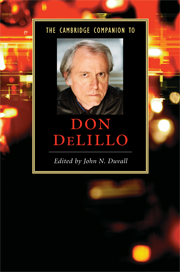Book contents
- Frontmatter
- Introduction: The power of history and the persistence of mystery
- PART I AESTHETIC AND CULTURAL INFLUENCES
- PART II EARLY FICTION
- 3 DeLillo and media culture
- 4 DeLillo’s apocalyptic satires
- 5 DeLillo and the political thriller
- PART III MAJOR NOVELS
- PART IV THEMES AND ISSUES
- Conclusion: Writing amid the ruins: 9/11 and Cosmopolis
- Select bibliography
- Guide to further reading
- Index
- Series List
4 - DeLillo’s apocalyptic satires
from PART II - EARLY FICTION
Published online by Cambridge University Press: 28 June 2008
- Frontmatter
- Introduction: The power of history and the persistence of mystery
- PART I AESTHETIC AND CULTURAL INFLUENCES
- PART II EARLY FICTION
- 3 DeLillo and media culture
- 4 DeLillo’s apocalyptic satires
- 5 DeLillo and the political thriller
- PART III MAJOR NOVELS
- PART IV THEMES AND ISSUES
- Conclusion: Writing amid the ruins: 9/11 and Cosmopolis
- Select bibliography
- Guide to further reading
- Index
- Series List
Summary
Small wonder Don DeLillo abandoned advertising. In 1964, five years into a promising career with Ogilvy & Mather, DeLillo quit, not to do anything as grand as write (though he had published two stories) but more because he found the premise of advertising, with its cheesy delight in surfaces, empty and incompatible with the larger perspectives that intrigued him. The son of Italian immigrants, DeLillo was raised amid the pageantries of pre-Vatican Two Catholicism and attended a Catholic prep school, where the drama of a material universe destined for purification by imminent apocalypse was as real as math or biology. Among the Jesuits at Fordham, DeLillo was enthralled by the far-reaching implications of philosophy and theology, encouraged, despite (or perhaps because of) the evident spiritual desiccation of his postwar boom culture, to approach the material universe as the abiding mystery of a created thing and, in turn, the complex circuitry of the human creature as infinitely more intriguing through its possession of something called a soul, which altered the very understanding of understanding itself.
Such conceptions, of course, put DeLillo at odds with his cultural moment. Emerging amid the Beat energy and avant-garde audacities of 1950s New York, DeLillo in his early fictions tested but could not endorse the chic existential angst of the New Wave films he admired. Such emotional thinness flatlined into glib ennui, glamorous self-destruction, and self-serving alienation. Living amid the quiet panic of civil defense drills, the nerveless assembling of piles of nuclear weaponry, and the wonderland logic of Mutual Assured Destruction, DeLillo cast a wary eye on his culture's horizontal sense of apocalypse, a shoddy sort of cataclysm defined by a culture uninterested in lifting its collective vision above the material realm.
- Type
- Chapter
- Information
- The Cambridge Companion to Don DeLillo , pp. 53 - 65Publisher: Cambridge University PressPrint publication year: 2008
- 5
- Cited by

